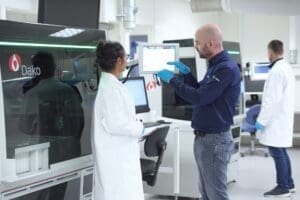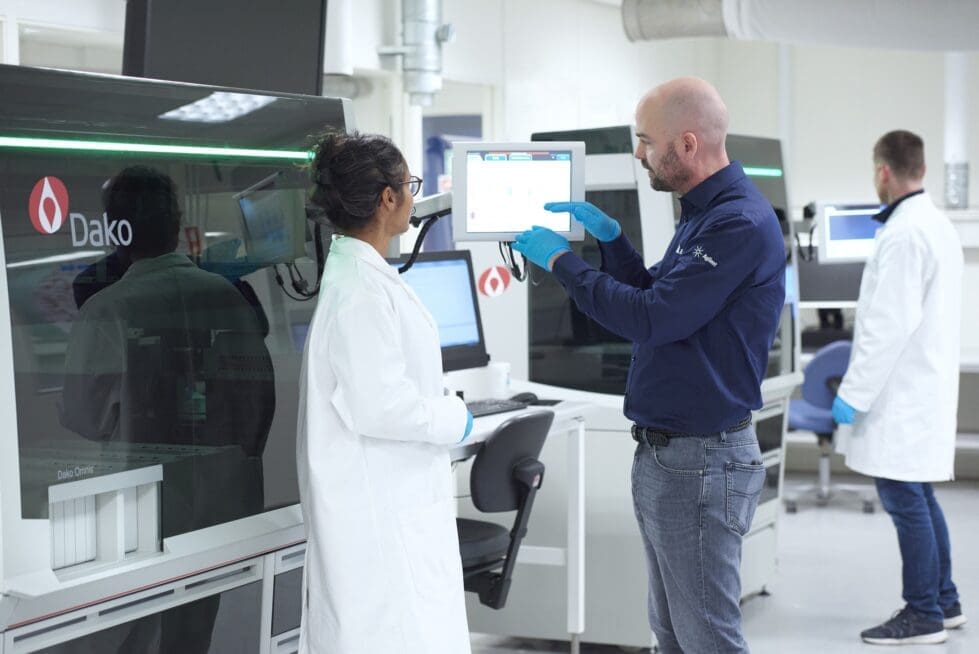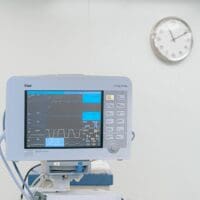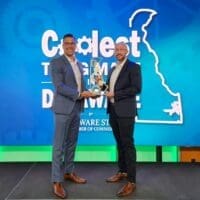

Agilent’s Dako system developed the breast cancer HercepTest that is celebrating its 25th anniversary this year.
Agilent Technologies and Incyte have begun working together to create tests that will help a patient understand how good a candidate he or she may be for Incyte’s immunotherapy treatments.
Incyte, a biopharmaceutical company headquartered in Delaware, specializes in drugs that treat unusual and rare cancers.
Agilent, headquartered in Santa Clara, California, with a campus near Greenville off Lancaster Pike, specializes in “companion diagnostics,” which are tests that can be used to check potential patients; cells and see how likely it is that Incyte’s drugs will help.


Paul Beresford
It often comes down to whether or not the patient has a lot or a little of the proteins that Incyte’s drugs want to activate.
In many cases, the drug needs to essentially lock onto those proteins to manipulate the body’s immune system into attacking the cancer.
Therefore, the more protein, the better for the patient. The fewer proteins there are on the surface of a molecule, the less likely it is the treatment will work for that specific patient.
Agilent’s tests often require a biopsy — or taking a tiny piece — of a patient’s tumor so its cells can be checked for things like the production of proteins.
Companion diagnostics are a hot topic in the biopharmaceutical business and are predicted to expand to nearly $14 billion in U.S. sales by 2030, partly because these tests help doctors target treatment decisions for a growing range of cancers and some chronic diseases.
Ultimately, said Paul Beresford, vice president and general manager of Agilent’s Companion Diagnostics Division, the point of companion diagnostics is to help both pharmaceutical companies and doctors “select the right patient for the right drug at the right time.”
Agilent and Keytruda
Former President Jimmy Carter credits the immunotherapy drug Keytruda with destroying the brain tumors he was diagnosed with in 2015. That raised the profile of immunotherapy.
Agilent worked with Keytruda maker Merck on companion diagnostics for that drug, focusing on a patient’s antibodies.
“It was one of the biggest companion diagnostics ever brought to market,” Beresford said.
Agilent’s and Incyte’s scientists will work together and separately on those diagnostics for drugs under development.
“So when their drug comes to market, the diagnostic comes to market and then we go commercialize a drug and diagnostic together,” Beresford said.
Neither company revealed the financials of the deal.
It will allow Agilent to expand its companion diagnostics portfolio with novel biomarkers and Incyte to leverage Agilent’s expertise in the test development, global regulatory approvals and commercialization to support clinical trials as well as the potential registration and commercialization of the diagnostics in the United States and Europe.
Ultimately, Beresford said in a press release, the companies hope to speed up the development of precision medicine products, and help improve patient outcomes in the precision oncology sector.
“I’m a big believer in immunotherapies,” said Beresford, who has a PhD in immunology.
MORE BUSINESS NEWS: Hydrogen company will expand in Dover
Keytruda’s success became an industry standard, he said.
“Now we’re looking at different ways in which we can also combine different types of immunotherapies with Keytruda,” Beresford said. “So that’s the next big wave.”
Jeff Jackson, group vice president of Incyte’s Translational Medicine department, said the Delaware company is looking forward to the collaboration.
“Agilent’s expertise in the development of companion diagnostics is impressive, as is their regulatory and commercialization record,” he said.
The company’s name may be familiar to Delawareans residents partly because it gave Delaware State University a $1 million grant to help pay for tuition and board for 21 students to encourage more minority students to enter biotech fields.
Agilent this year is celebrating the 25th anniversary of HercepTest, a tool for assessing HER2 expression in breast cancers. That helps oncologists improve the chances for a patient to recover.
Since the launch of HercepTest, Agilent has introduced several additional companion diagnostic tests.
Among these, the PDL-1 IHC 22C3 – the cell receptors the drugs activate – franchise has been particularly successful, offering a continually expanding range of tests for assessing PDL-1 expression.


Betsy Price is a Wilmington freelance writer who has 40 years of experience.
Share this Post








